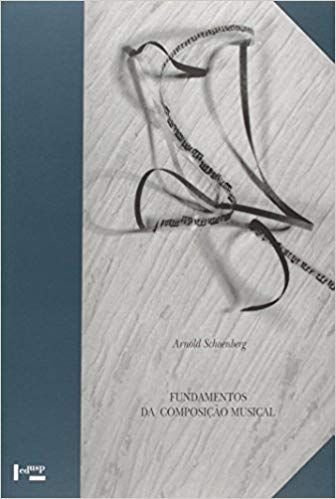Livro: Fundamentos da Composição Musical, de Arnold Schoenberg (1874-1951)

1
Este é o primeiro livro do compositor Arnold Schoenberg (1874-1951) traduzido no Brasil, a obra foi originalmente pensada e organizada entre 1937 e 1948, a partir da experiência do autor com estudantes universitários nos Estados Unidos.
É o terceiro dos grandes tratados didáticos de teoria e prática que escreveu, e sua edição final, a partir de versões preliminares deixadas pelo compositor, foi feita em 1965 por seu colaborador, e compositor, Gerald Strang (1908-1983).
A parte I é dedicada à fundamentação teórica do que poderíamos denominar de "sintaxe musical", como os conceitos de forma, frase, motivo, a construção de temas, acompanhamentos, carater e expressão.
A segunda e a terceira constituem os fundamentos de aplicação da análise, tanto das pequenas formas, (binaria, ternaria, minueto, scherzo, e temas com variação) quanto das grandes, como o rondó, sonata. Parte esta com uma intersecção das áreas do saber musical, em que se polarizam questões referentes a harmonia, contraponto, expressão, caráter, andamento, ritmo e outros fatores relevantes
O principal mérito de Fundamentos da Composição Musical é o de abordar, e associar, de forma didática, e profunda, um repertório básico destinado a todos os estudiosos e interessados em música.
Apesar de possuírem um certo grau de independência, seus conteúdos se interpenetram de maneira profunda e consistente, associando o pensamento, prática, e didatica musical, adquiridos por Schoenberg numa vida dedicada a composição, ensino, e reflexão.
Espero que gostem =D
Um grande abraço
Guilherme Faquetti
09 de fevereiro de 2019

The classical music community at #classical-music and Discord. Follow our community accounts @classical-music and @classical-radio. Follow our curation trail (classical-radio) at SteemAuto Community Logo by ivan.atman

This is the first book of the composer Arnold Schoenberg (1874-1951) translated in Brazil, the work was originally thought and organized between 1937 and 1948, from the author's experience with university students in the United States.
It is the third of the great didactic treatises of theory and practice that he wrote, and his final edition, from preliminary versions left by the composer, was made in 1965 by his collaborator, and composer, Gerald Strang (1908-1983).
Part I is dedicated to the theoretical basis of what we might call "musical syntax", such as the concepts of form, sentence, motif, construction of themes, accompaniments, character and expression.
The second and third are the fundamentals of application of the analysis, both of the small forms (binary, ternary, minuet, scherzo, and themes with variation) as well as the great ones, such as the rondo, sonata. Part is an intersection of the areas of musical knowledge, in which questions concerning harmony, counterpoint, expression, character, tempo, rhythm and other relevant factors are polarized
The main merit of Fundamentals of Musical Composition is to approach and associate, in a didactic and profound way, a basic repertoire destined for all scholars and interested in music.
Although they possess a certain degree of independence, their contents interpenetrate in a deep and consistent way, associating the thought, practice, and musical didatica, acquired by Schoenberg in a life dedicated to composition, teaching, and reflection.
Hope you enjoy =D
A great hug
Guilherme Faquetti
February, 09, 2019
Sponsored ( Powered by dclick )
DCLICK: Introducing the Advertise feature
Last week, the Advertise feature has opened. you can...

This posting was written via
dclick the Ads platform based on Steem Blockchain.
Dear Artzonian, thanks for using the #ArtzOne hashtag. Your work is valuable to the @ArtzOne community. Quote of the week: Art, freedom and creativity will change society faster than politics. -Victor Pinchuk
Congratulations @guifaquetti! You have completed the following achievement on the Steem blockchain and have been rewarded with new badge(s) :
Click here to view your Board
If you no longer want to receive notifications, reply to this comment with the word
STOPHi, @guifaquetti!
You just got a 0.36% upvote from SteemPlus!
To get higher upvotes, earn more SteemPlus Points (SPP). On your Steemit wallet, check your SPP balance and click on "How to earn SPP?" to find out all the ways to earn.
If you're not using SteemPlus yet, please check our last posts in here to see the many ways in which SteemPlus can improve your Steem experience on Steemit and Busy.
Your post has been supported and upvoted from the Classical Music community on Steemit as it appears to be of interest to our community.
If you enjoy our support of the #classical-music community, please consider a small upvote to help grow the support account!
You can find details about us below.

The classical music community at #classical-music and Discord.
Follow our community accounts @classical-music and @classical-radio.
Follow our curation trail (classical-radio) at SteemAuto or help us out with a delegation!